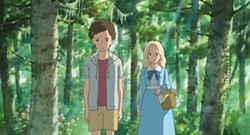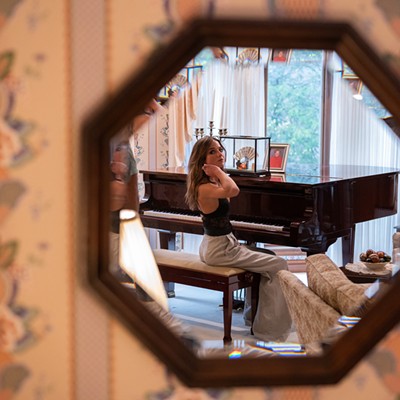When Marnie Was There is the latest (and perhaps last) lushly animated feature from Japan's Studio Ghibli. After the retirement of its two famed co-founders and directors, Hayao Miyazaki (Spirited Away) and Isao Takahata (Grave of the Fireflies), the animation house is reputedly scaling back production. If so, this current release may serve as a bittersweet reminder of a creative team that produced consistently fine entertainment, noted as much for its sensitive storytelling as its gorgeous animation.
When Marnie Was There, directed by Hiromasa Yonebayashi, is adapted from the 1960s British young-adult novel by Joan G. Robinson. (Yonebayashi's 2010 film The Secret World of Arietty was also adapted from a classic English children's tale, The Borrowers.)
In it, we meet Anna, an unhappy, somewhat sickly 12-year-old girl, whose foster parents send her to the country for the summer. Anna spends her time feeling sad and sketching an object of fascination in the sleepy town — a large, abandoned mansion perched on the edge of a marsh.
Then she spies an occupant in the house, a lively blonde-haired girl named Marnie. They quickly bond, and though Anna finds Marnie and the house (which sometimes is not dilapidated) somewhat mysterious, having a friend is wonderful. The two girls share their troubled pasts and presents — both are bright, creative children who feel neglected by their parents, and removed from their peers; among the secrets they share are those that eventually lay bare the essence of Anna and Marnie.
The story is relatively simple, toggling between lazy summer days and the occasionally dreamlike adventures of the girls. (Is Marnie a ghost? An imaginary friend? Just another odd child?) There's a bit of mystery: the Gothic-lite narrative of Marnie trades in many of the genre's hallmarks (weird old mansion, flowing hair and dresses, mistreatment by mean servants and a hinted-at traumatic event).
But the main story is really the emotional development of Anna, as the summer teaches her to like herself, and to embrace those she had previously shut out. The film is resolutely sweet and affirming, though the story doesn't shy away from the darker sides of life — death, illness, sadness, isolation. These aspects are gently woven through the tale, and of course, mitigated by life's pleasures: kindness, sunshine, laughing together, even the heady anticipation of slicing into a plump fresh tomato.
The relationship themes and time vagaries of Marnie are likely too complex for very little kids, but older children may find much to relate to in Anna's tale. And, of course, the hand-drawn animation is rich and exquisite. A gentle summer get-away for young and old.
















